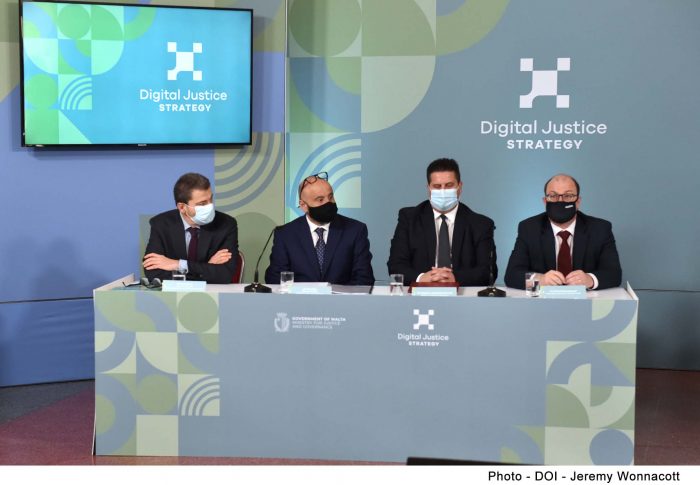
During a conference, Minister for Justice and Governance Edward Zammit Lewis and Parliamentary Secretary for European Funds Stefan Zrinzo Azzopardi launched the Digital Justice Strategy and Action Plan – an 18 month long journey that stands testimony to our commitment towards making our justice system more efficient, effective, and accessible.
Minister Zammit Lewis started his welcome address by mentioning that, “Over the past months, due to the Covid-19 pandemic, we were forced out of our comfort zones and made to embrace technology as a means to ensure that justice continues to be served. We have emerged from the pandemic with a new sense of purpose and to embrace change. The Maltese justice system is not new to the digital sector, however the adaptation of this strategic framework is a priority as it identifies objectives and makes the best use of available technologies, whilst respecting the rule of law and the substantial and procedural rights of all citizens”.
This government invested in digitalisation, the next major phase in the evolution of society and the justice sector. Malta is now in a unique position to forge the future of how justice will be served in the years to come. This strategy provides a common vision and unites all justice entities in their efforts to embrace this transformation and commit to the process of change without reservations.
This strategy will be implemented within a national digital landscape that is right at the forefront of innovation and technology and aligns itself perfectly to the Maltese public service policies, which make it a leader in the use of ICT for the public service. Minister Zammit Lewis continued by highlighting the importance of the selected strategic goals; digital by default, access to justice, analytic capabilities, as well as building and improving digital skills and competencies. These strategic goals shall be achieved within a culture marked predominately by consistent stakeholder involvement, interoperability, reusability, accountability and transparency. This government needs to ensure that the legislative framework is at par with the technological innovation, and the need to drive change whilst upholding the rights at law of every citizen. In order to achieve the mentioned targets, ministerial structures will be set which will ensure that the strategic goals are achieved within the six year time-frame of the strategy. This government will lead, guide and support all justice stakeholders in the transition to a more efficient and accessible user-centred justice system.
This strategy would have not been possible without the constant support and cooperation of the Structural Reform Support Programme within the funding framework offered by DG-Reform, and the expert assistance of CEPEJ, within the Council of Europe, who has guided this transformational strategy.
“The Robert Abela administration will remain committed and renowned for the digital transformation and reforms carried out in the justice system. We shall continue to invest in order for our justice system to become more efficient, effective and accessible.”
Daniele Dotto, Acting Director at DG reform of the European Commission, praised the commitment of the ministry in securing funds to carry out important reforms in the field of justice. In so doing, Malta is actively leading the way to provide access to justice along the lines of what is required on a European level. This makes Malta a proactive member in the European arena.
Parliamentary Secretary for European Funds Stefan Zrinzo Azzopardi said that this action plan for digital justice is certainly an important process on which we can build several steps for the future.
He added that, with an investment of around €300,000 co-financed with European funds, the digitalisation of the justice system will be improving the efficiency and facilitating access to justice for those who go to court.
Dr Zrinzo Azzopardi said that, from the Recovery and Resilience Plan, we will have an investment of around €10 million in order to have more digitalisation in the field of justice. This is an important step through which we will provide more tools to ensure that the field of justice in our country is more efficient and provides a better service to the citizen.
He concluded by saying that, as part of our country’s economic recovery framework, this government has chosen to continue investing in the judicial system.










